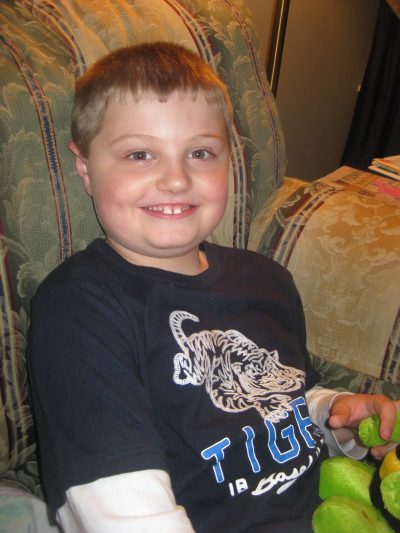
I know. You’re in the middle of what’s been called “siege mode,” and it’s hell. You don’t know if your son will survive it. You don’t know if you will pay enough attention to his little sister ever again. You don’t know if you will survive it.
You just want your life back. Even with autism, there is a “normal.”
Things were going pretty well. Maybe you’d heard a few words recently. Perhaps a good school report came home, another positive one in a long string of happy days for your daughter. Maybe your five-year-old son has been sleeping through the night for months. Your daughter ate a vegetable, kept it down, and the apocalypse did not occur.
|
|
Maybe you let your guard down, just a little.
And then one day, it happened. Just the once. Maybe you watched in horror as your son banged his head upon a wall. Your daughter, who’d been sleeping like an angel, was up half the night. Your son pinched you hard for the first time in six months.
You’ve told yourself the behavior is just an anomaly, an outlier of autism. You tell yourself it won’t rear its ugly head again.
Except, it does. And it decides to stick around.
Whatever it is, the head banging, the pinching, the lack of sleep, the aversion to ever leaving the house, it takes up unwelcome residence once again, or perhaps this behavior is new. By now you know the drill. You consult your son’s behaviorist. You talk to your daughter’s neuropediatrician about upping her meds, or perhaps going through the long waiting period of a new one. You go online. You talk to your “autism friends.” You argue with your husband about how to make it stop.
You know you’ve conquered other extreme challenges in the past, but this time, you are tired.
You are always so damn tired.
I know you’re tired, because I’ve been there too.
It took years before my eldest son, who is severely autistic, learned how to sleep through the night, but when that one was conquered, it finally stuck. We had regression after regression with potty training, but by age six accidents were few and far between.
One day I even got him to trade some carbs for salad, and lightning did not strike.
The aggression comes and goes, but for the last few years, thankfully, it’s mostly quelled. The OCD, his companion diagnosis, well we view that as another permanent resident, our third child. We’ve just come through a particularly difficult stretch of two years, enduring a myriad of behavior plans and multiple medication attempts. Finally, we hit the jackpot. Finally, he stopped organizing every non-bolted-down object in our house in his unhappy and frenzied attempts to impose his order on everything, and we saw our predominantly happy boy returned to us. Finally, my husband and I began once again to breathe.
Finally, we returned to “our normal.”
Right now, I know you’re in the throes of it. You want so much to help her, but you’re not sure you ever will. You’re exhausted. You’re resentful. You’re guilty about being resentful.
You just want it to stop.
People will ask you how he’s doing, and you find it easier to plaster that smile on your face and say “he’s fine” rather than trying to describe his newest obsession. You just can’t explain to a mom of a typical kid how much your heart is hurting for your daughter. You continue to work, or volunteer. Even at your breaking point there’s still laundry to do, meals to make, errands to run. You put on a smile when you run into your other child’s teacher at the grocery store. You try not to fight too much with your husband. Sometimes, you feel like giving up.
Don’t.
I am now the mom of a severely autistic thirteen-year-old, and even after almost a decade-and-a-half of living in autism land I’ve seen few things that universally affect all families. Perhaps the only thing everyone agrees upon is that Early Intervention helps.
That, and getting your autistic kid to sleep is a win-win for all.
But I’ve seen this in my own home, and in my friends’ homes. I’ve heard countless stories of acquaintances’ autistic children, and read my favorite bloggers’ posts online. There is, perhaps, one more universal other than early therapy and unconsciousness.
Most of the time, behaviors come and go in cycles.
I’ll say it again. Most of the time, the behaviors come and go in cycles.
Often, with patience, time, the right therapy, the right medication (or all of the above,) we can help our kids. We can alleviate the most egregious symptoms of whatever is causing them, and us, such torment.
We can return to our normal.
So wherever you are in this latest siege, don’t give up hope.
Maybe it’s been a few weeks. Maybe it’s been months.
Maybe it seems like it’s gone on forever.
Take each challenge one step at a time. Rally all your resources. Ask for help. Remember to take care of yourself.
Again, remember to take care of yourself.
And breathe.
For more on my family visit my blog at autismmommytherapist.wordpress.com
Follow me on Facebook at Autism Mommy-Therapist











